Sitting on a worn-out green sofa outside Durban’s giant Glebelands hostel, Thulani Kati describes in graphic detail his alleged torture by a special police unit on October 2 this year. Kati (38), wearing jeans and a South African Communist Party T-shirt, says the policemen accused him of hiding firearms.
Glebelands, home to about 22 000 rural migrants, mostly men, is an ANC and SACP stronghold. The red-brick hostel blocks have nicknames such as “Russia”, “Cuba” and “Solomon Mahlangu”, the ANC struggle martyr.
The complex has been hit by an upsurge in murderous conflict, with 15 deaths since April. The violence is said to centre on two ANC factions, one supporting ANC ward 76 councillor Robert Mzobe and the other comprising his opponents, including block committee chairpersons.
There are allegations that the provincial government has weighed in on Mzobe’s side, particularly by scrapping the committees.
Kati, the former block P committee chairperson, claimed that six policemen arrived at his block at about midnight with a piece of paper. One of them pointed out a name and demanded: Is this you – ‘Commander’?”
“When I said that was my nickname, he hit me with his rifle, and a coloured policeman hit me in the chest. They put cable ties around my hands and took me inside my room. They asked: ‘Where are the big guns?’ I told them ‘I have no guns.’
“They pushed me to the ground. Four of them held me down while the others kept putting a plastic bag over my head. I couldn’t breathe.”
‘Two camps’
Kati said he was handcuffed and driven to the Glebelands sports ground where “I saw a lot of policemen camping. They asked me which of the ‘two camps’ I belonged to. I said ‘I have no camp, I just stay there.’
“They asked me: ‘Where’s the gun? Now you must speak the truth, or we will do a very bad thing to you’.”
He said he was pushed to ground and held down while a “tube” was placed over his mouth.
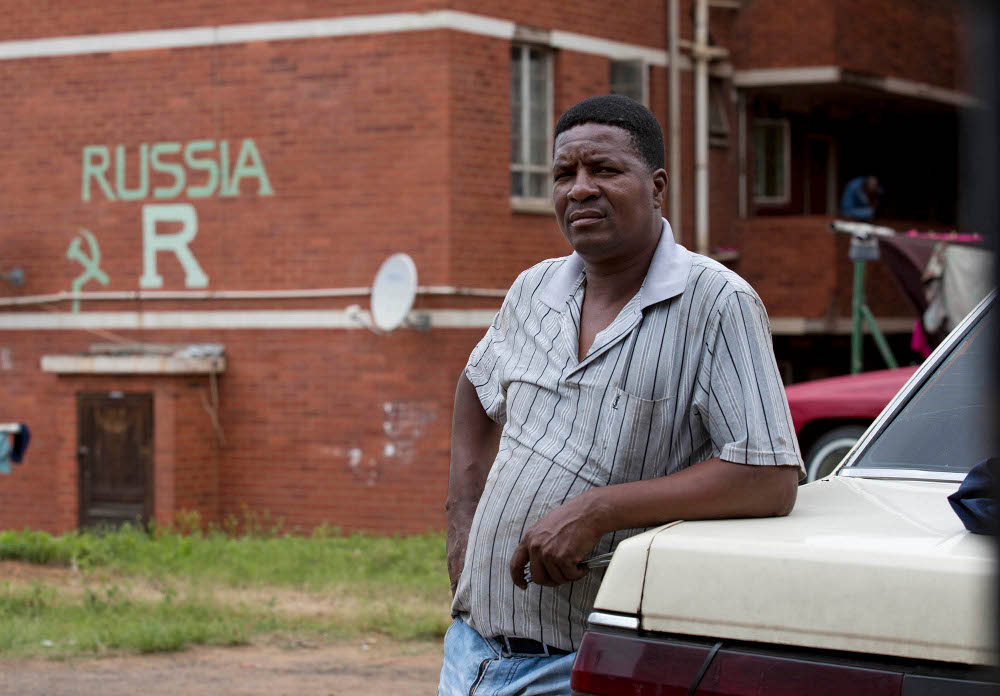
Bongani Mthembu is chairperson of Ubunye bama Hostela, a nonpolitical body representing residents. (Photos: Rogan Ward)
“They said: ‘When you want to tell us the truth, push your legs three times.’ I lost consciousness.
“They shook me awake and said: ‘Where’s the gun? Where did you throw it?’ I told them the way they were treating me was not right and that I was going die.”
Kati says that, in an effort to escape, he told the policemen he would show them where his gun was hidden. After a fruitless search, he was again allegedly suffocated, before being released.
The next morning he laid a charge at the Umlazi police station.
No comment
Captain Thulani Zwane, the provincial police spokesperson, said he could not comment on the case because it was being investigated by the Independent Police Investigative Directorate. Moses Dlamini, the directorate’s spokesperson, confirmed this.
The alleged incident occurred a few days after KwaZulu-Natal Premier Senzo Mchunu and the eThekwini mayor, James Nxumalo, told a mass meeting of hostel residents at the sports grounds of how the government intended to end the violence.
They told residents the plan was to install “surveillance cameras and unshielded floodlights to deter criminal activities and intruders … this will also help residents feel safer and reduce … theft and damage to property. We have deployed an undisclosed number of police officers from other provinces to do random searches, man roadblocks and other special operations to root out crime in the hostel.”
Mchunu told the meeting the “selling” of beds by individuals was the root cause of murders and instability at Glebelands. He said the eThekwini municipality, the landlord, would handle all matters related to rent and occupation in future. The living conditions of residents would be improved and they would be protected from “unscrupulous and illegal landlords”.
Vanessa Burger, of the University of KwaZulu-Natal’s Centre for Civil Society, said the special police unit was brought in after allegations of collusion between Umlazi police and the Mzobe faction.
But according to Kati’s account, the special police unit’s methods do not seem markedly different from those of the Umlazi police.
Far-fetched allegations
The KwaZulu-Natal police spokesperson, Colonel Jay Naicker, said the allegations made about the police were far-fetched. Those deployed were not from the area and therefore would not take sides.
“These allegations will only come up when people are trying to fuel tensions and ensure there is no peace and stability at the hostel. According to the law, we cannot keep one group in custody longer than another group,” he said.
Naicker urged the media not to be influenced to write articles that would further fuel violence and tension in the hostel.
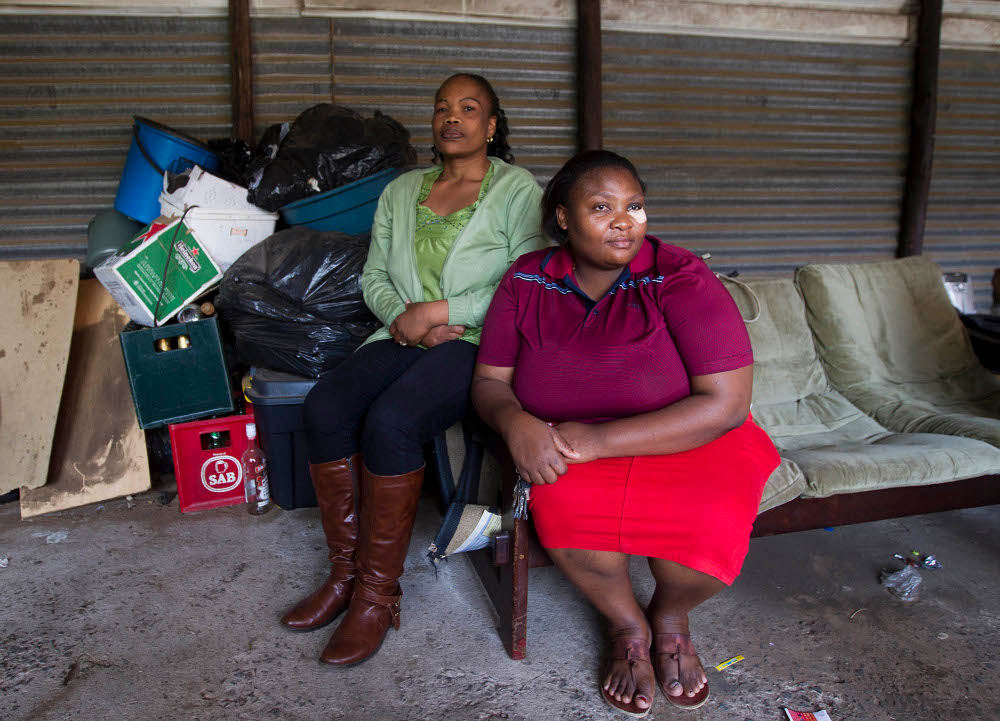
Residents Nomwanda Diko (back), who was allegedly driven out, and Khumbuzile Mqadi.
In March this year, Burger was approached to help in Glebelands by Mthembiseni Thusi, the spokesperson for Ubunye bama Hostela, a nonpolitical organisation for hostel residents. He pleaded for help after the death of Zinakile Fica, a hostel resident in his early 40s.
Dlamini confirmed the directorate was also investigating this case.
ANC power-broker
Mary de Haas, who monitors violence in the province, said, despite pleas by hostel residents and civic organisations for Mzobe to be removed as a councillor, his standing in the ANC seemed to have secured his position. “Mzobe was linked to the ANC’s late regional strongman John Mchunu … it all depends on who you’re affiliated with.”
Now it seems Mzobe is a power-broker in his own right.
Since last year, the block chairpersons and other residents of the ward not living in the hostel have taken to the streets to demand his removal, claiming he was unapproachable, divided the community and did not consult them about developments in the ward.
During one protest, his office was set on fire.
Negotiations between the province and protesters followed, but were delayed by this year’s election.
In an interview, Mzobe distanced himself from the violence. “I’m a councillor because I was elected by the people. How can you associate me with criminal activity?” he asked.
Asked to comment about the high number of murders, he said it was a criminal matter. “This problem is for the law to deal with, not the councillor. Ask me about other things.”
‘Don’t spoil my day’
Questioned more closely about the allegations about him, Mzobe snapped, “Don’t spoil my day,” and rang off. Instead of trying to mediate, the provincial government appears to have resolved to crush the block committees, accusing them of being the source of the conflict. They were “dissolved” last month, allegedly on Mchunu’s instructions.
Burger said the move caused “consternation and disbelief” among residents, as the eight-member committees mediate in disagreements between residents, assist in bed allocations, convey residents’ concerns to the hostel superintendent, and sometimes work with the police when criminal activity is discovered.
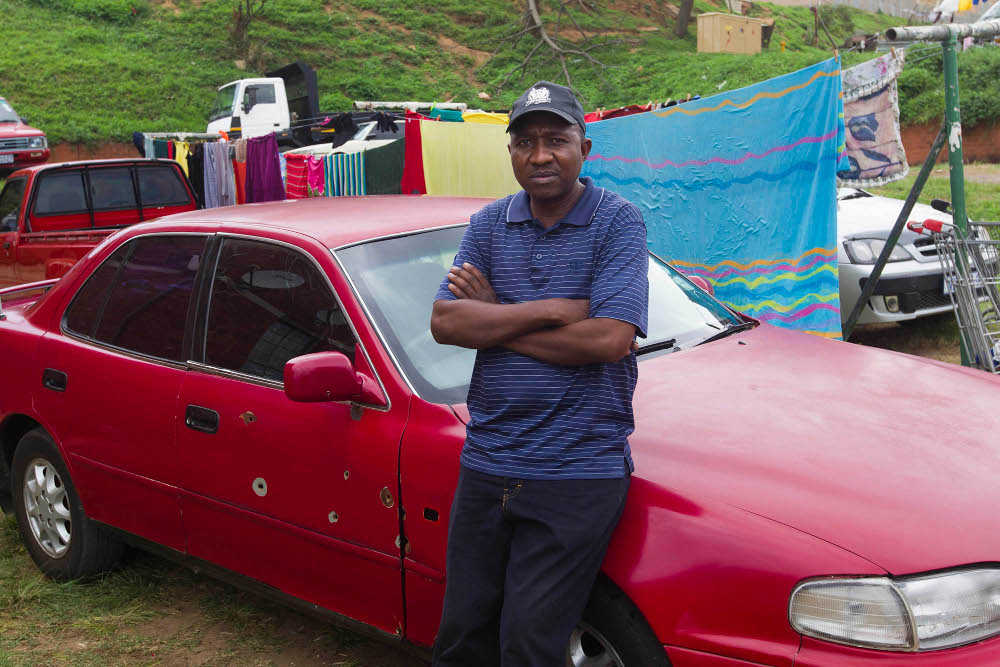
Thokazani Maci’s car was attacked at Glebelands.
Burger said they also played an important role in liaising between residents and the municipality.
“Without them, residents fear they will be excluded from decision-making on hostel development projects. There will be a lack of control and lawlessness can easily spread. They will no longer have a voice.”
Thusi said the committees were democratically elected by the hostel residents. “Ubunye supports this. Not having block chairpersons means those people must live like animals.
“There will be a breakdown of law and criminals will flood in. Residents will have no more participation in issues surrounding their own homes.”
Protection fees
Ndabezinhle Sibiya, Mchunu’s spokesperson, said the committees were disbanded because they and the block chairpersons “were charging people rent and protection fees … People were getting killed because they were not paying these fees.”
“The municipality developed this policy whereby only one party, the municipality itself, is responsible for protecting the citizens and for the hostel. Committees were fighting each other, but they don’t own the hostels.”
Thusi, who lives at the Dalton Road hostel in lower Umbilo, disagreed. “Some block chairpersons may be corrupt but they cannot all be,” he said. “The premier should have told the community to expose those selling beds and have them arrested.”
He said in the 1980s “all hostels were ruled by different parties. If an ANC Glebelands resident came to Dalton, which was IFP, we would kill him, and vice versa.”
The hostel residents realised that political leaders were using them “because, while we were losing lives, they were not losing anything”. They decided to form Ubunye, which includes supporters of all parties.
“We are sharing our ideas as residents, not as party supporters.”
Real causes
At Glebelands, residents said they believe Mchunu was not tackling the real causes of the violence.
“I’m scared,” said former block 57 chairperson Sibusiso Hluthwa (45), a slight, bespectacled man who works as a security guard in central Durban. He was too afraid to disclose exactly where he worked and refused to be photographed.
“Three days ago I heard the police are looking for me. I don’t understand why.” Hluthwa and Kati echo the view that the dissolution of the block committees was a mistake. “I don’t think the premier understands the chairperson’s duties,” Hluthwa said.
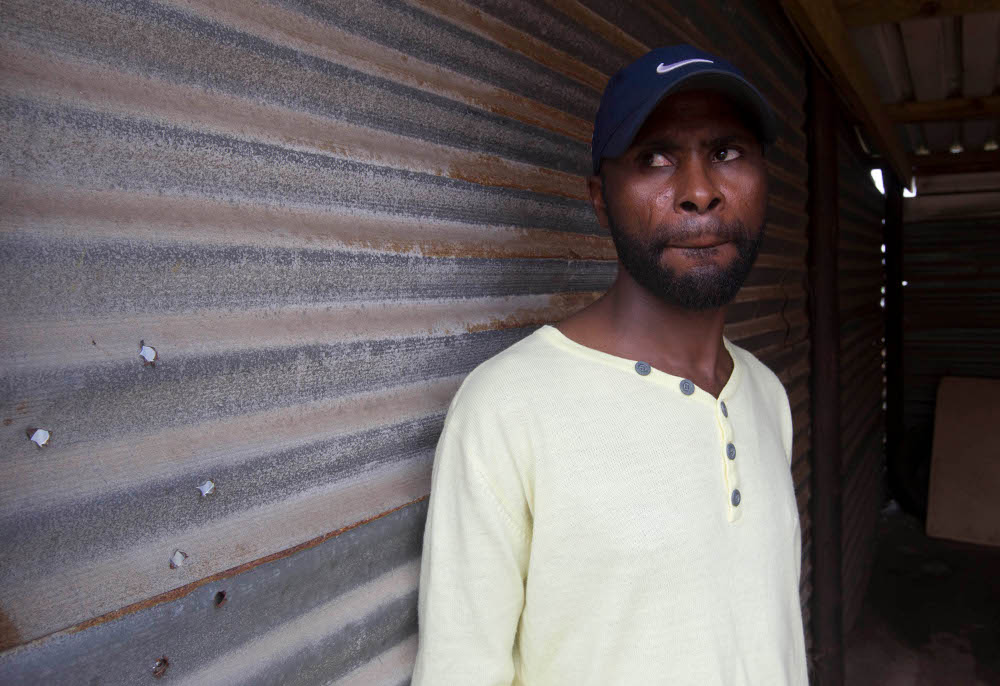
Richard Nzama was shot in the continuing violence and intimidation at Glebelands.
“When people stay in blocks, there must be committees. People stab each other; they may try to rape. With block chairmen around, it’s not easy for criminals because we screen everyone coming in.”
Hluthwa gave a chilling account of what has happened to him since negotiations with the province lapsed. “In April, a group of people came to my block while I was sleeping. They were led by two supporters of the councillor [Mzobe], wearing ANC T-shirts and singing.
“They entered the block and started forcing people to gather for a meeting. They even came to me but I said procedures for the meeting weren’t followed.”
‘Corrupt’ committees
One of the leaders told the meeting he was there to listen to complaints and that the police, the superintendent and the councillor knew he was there, so residents should not be afraid to speak.
“Then he said they have come to finish the block committees. He said they are sick and tired of them, they are corrupt and selling beds and that they must leave Glebelands.”
Hluthwa said that, when he told them to address problems through existing structures, “they started beating me. I was bleeding all over.”
Hluthwa said he had opened a case at the Umlazi police station, which seemed not to have been investigated. He said he was forced to leave the hostel a few days later when a mob petrol-bombed his room.
Zwane, when asked for an update on Hluthwa’s case, referred the query to the Umlazi police station, which did not respond.
Hluthwa denied selling beds, saying: “The aim is to evict anyone who has been against the councillor.”
Victims
According to Burger’s records, the names of only eight of the people killed since April are known: Thandiwe Ntobela, Ruster Shinga, Vusi Ngema, a priest known only as Wesley, who was shot dead while praying for the Block R community, Xolisile Nkosiyabo, Sandile Mtheshane and Venge Zoleka.
Police did not respond to requests for the confirmation of these names and the details of other victims.
During the same period, about 100 people are said to have been driven or locked out of their rooms, which Burger described as forced evictions. “Many others have been arrested on charges of possession of firearms and selling beds. All were linked to the block committees.”
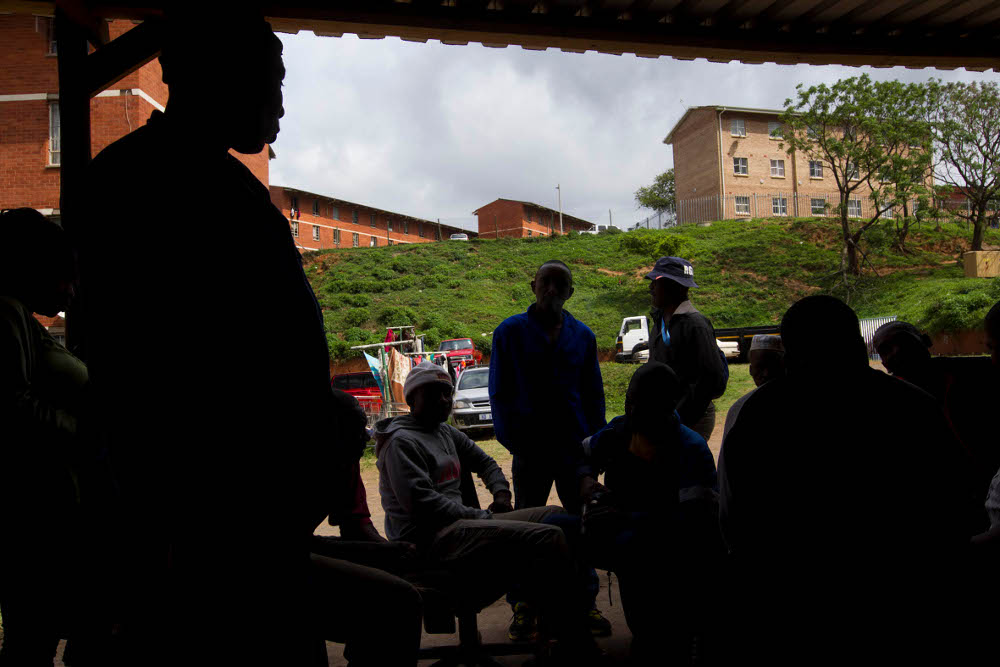
Residents who were intimidated and attacked meet at a garage in Glebelands.
Nomwanda Diko, a 41-year-old single mother, said that in July a group of 15 men visited her room while she was at work and told her daughter the room should be vacated by the next day.
“I was so shocked and I couldn’t sleep all night, but the superintendent told me to remain in my room while he investigated,” she said. “The next day he told me he asked these men why they are chasing me away, and they said it is because I have a relationship with their enemies.”
Terrified, Diko and her daughter began to hide in other rooms at night, returning to their room only during the day. “One day I found they had broken the door. I went to the police station and reported the case, and fixed the locks on my door.
“But after three days I found someone put new locks on the doors and we were locked out.”
Diko has since moved to nearby Lamontville, where she is battling to pay a monthly rent of R800. Others, including Hluthwa, remain at Glebelands, “squatting” with friends.
Barbara Maregele is an intern at the M&G Centre for Investigative Journalism (amaBhungane). Fatima Asmal is a freelance contributor to the Mail & Guardian.